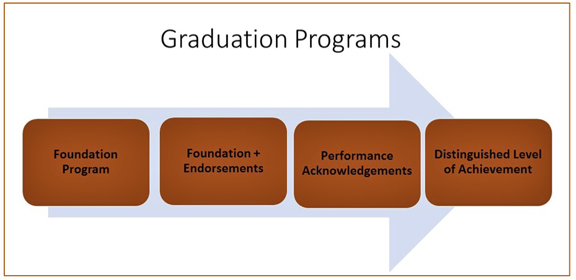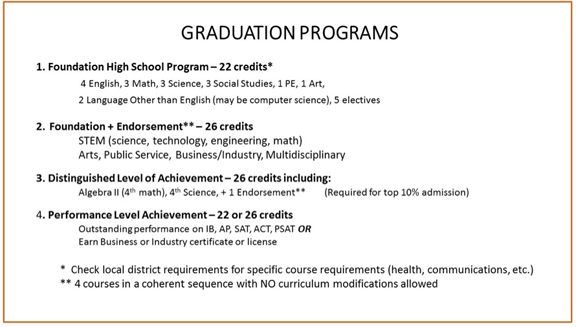en Español • Print • Share

Some states have different diplomas for students who graduate under an IEP. In Texas, there is only ONE diploma for all students. Students graduating under the various High School Programs receive the same diploma. It is the Academic Achievement Record (or transcript) – not the diploma – that differentiates the student’s individual accomplishments, achievement, and courses completed.
Every public high school student in the state of Texas must follow one of the State Graduation Programs in order to receive a diploma. The graduation program your child chooses will determine the courses he or she must take and how many credits he or she will need to graduate.
State graduation requirements have changed many times over the past decades, so be sure you know what the requirements are for the year your child enters the ninth grade.
Currently in Texas, there are four graduation programs:
- The Foundation program (22 credits)
- The Foundation program plus an Endorsement (26 credits) which includes a 4th science & math plus courses for endorsement
- The Distinguished Level of Achievement (26 credits)
- Performance Acknowledgement (22 or 26 credits) – Outstanding performance on specific tests or earn a business/industry certificate
For more specific details – please see the TEA 2014-15 Side By Side description of courses (pdf) or the Graduation Toolkit.

How do accommodations and modifications factor into the graduation plan?
Your child may receive instructional accommodations and still graduate under the Foundation plus Endorsement or Distinguished Achievement level programs.
**Receiving modifications to curriculum (having IEP goals that reduce learning) may result in your child NOT being eligible to receive an endorsement and graduating under the Foundation graduation program. Your child can still take endorsement courses with modifications, but the ARD/IEP committee will determine that the curriculum, with modifications, still is sufficiently rigorous enough to earn an endorsement.
If your child can earn a business or industry certificate (i.e Serv Safe Food Handling, Hunter Safety or Boater Certification, American Red Cross First Aid/CPR, etc.) even with accommodations or modifications to the curriculum, your child may be able to also earn a Performance Acknowledgement.
Opting out of Earning an Endorsement Program
After your child’s sophomore year (10th grade), your child may opt out of earning an Endorsement. This can happen if you have been given notice of the benefits of graduating with an endorsement and you give your written permission. You will give permission on a special Opt Out Form.
The Foundation High School plan should be considered only when a campus team or ARD Committee – which includes you, the parent – agrees that the lesser plan is the most appropriate course of study for your child.
Course Substitutions
There should not be any course substitution for the Foundation program. For some students, fulfilling the requirements of the Foundation program may not be possible in the same manner as other students without disabilities. The ARD committee (which you are a part of) or the 504 committee will determine if your child cannot complete the Language Other than English (LOTE) or Physical Education (PE) requirements. See Course Substitutions for allowable substitutions.
A credit allowed to be substituted for the LOTE or PE credit may NOT be used to satisfy any other graduation credit requirement.
End of Course Assessments
Be aware that in addition to credit requirements, the state also requires students to achieve satisfactory performance on five End of Course assessments in order to graduate with a diploma. Please see Graduation Options to see any exceptions to this rule for students with disabilities. Under the Foundation program only, the ARD committee, which includes you and your child, can decide whether your child will need to pass the end of course assessments in order to graduate under a specific program.
What Parents Need to Know
If you think your child is capable of doing the coursework for earning an Endorsement or Distinguished level of achievement – and can pass the End of Course assessment – it is best to attempt this. The post-secondary opportunities for your child will be greater.
If post-secondary education is in your child’s future, take a look at the websites of the universities, community colleges, trade schools or certificate programs that he or she is interested in to see what the admission requirements are. Most colleges and universities review transcripts as part of the admissions process. For this reason, college-bound students need to make sure that their transcript will reflect at least the minimum entrance requirements of the school to which they will be applying. This will give you an idea of which courses will best prepare your child for the day when he or she fills out those college (or other) applications.
While many universities in Texas require the Foundation plus Endorsement graduation plan course work for admission, colleges outside the state may not require as many credits or similar courses. It is important to investigate all options. The Texas Council for Developmental Disabilities has created a Resource Guide on Higher Education and they also have links to a variety of colleges & universities.
Texas Education Agency Resources:
Certificate of High School Equivalency
Online College and Career Readiness Resource Center
Legal Framework for the Child Centered Process - Graduation
Region 11 ESC - Foundation High School Program and Students Receiving Special Education Services (pdf)
Texas Project FIRST Resources:
Other Resources:
